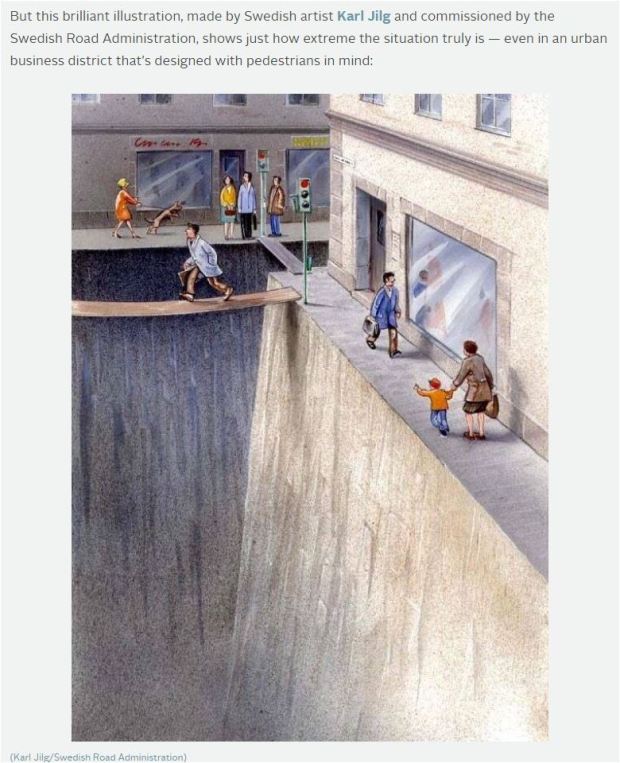Just how bad are “best practices” when it comes to the streets and sidewalks of our cities?
When it comes to city streets it is truly weird what we seem to be placidly willing to accept as “normal”.


When it comes to city streets it is truly weird what we seem to be placidly willing to accept as “normal”.

What were the main barriers that had to be overcome in initially adopting Sweden’s Vision Zero strategy?
 Matts-Åke Belin, Swedish traffic safety strategist: I would say that the main problems that we had in the beginning were not really political, they were more on the expert side. The largest resistance we got to the idea about Vision Zero was from those political economists that have built their whole career on cost-benefit analysis. For them it is very difficult to buy into “zero.” Because in their economic models, you have costs and benefits, and although they might not say it explicitly, the idea is that there is an optimum number of fatalities. A price that you have to pay for transport.
Matts-Åke Belin, Swedish traffic safety strategist: I would say that the main problems that we had in the beginning were not really political, they were more on the expert side. The largest resistance we got to the idea about Vision Zero was from those political economists that have built their whole career on cost-benefit analysis. For them it is very difficult to buy into “zero.” Because in their economic models, you have costs and benefits, and although they might not say it explicitly, the idea is that there is an optimum number of fatalities. A price that you have to pay for transport.
The problem is the whole transport sector is quite influenced by the whole utilitarianist mindset. Now we’re bringing in the idea that it’s not acceptable to be killed or seriously injured when you’re transporting. It’s more a civil-rights thing that you bring into the policy.
The other group that had trouble with Vision Zero was our friends, our expert friends. Because most of the people in the safety community had invested in the idea that safety work is about changing human behavior. Vision Zero says instead that people make mistakes, they have a certain tolerance for external violence, let’s create a system for the humans instead of trying to adjust the humans to the system.
 Why is it that virtually every major transport project built in the last decades in just about any part of the world has cost a great deal more than the original engagement, and served far fewer people than originally forecast? And since this pattern repeats itself time and again, and since in the process the one who ends up holding the bag every time is the hard-working and apparently infinitely gullible taxpayer, it is possible to come to a conclusion. And that has to be that, up to now at least, we are terminally stupid, we fall for the same old trick every time. Why is that, and what are its implications for the quality of mobility services in your city and metro area? We invited Dr. Colin Black who is currently working to get a handle on these issues from an overall European perspective to share his thoughts with us.
Why is it that virtually every major transport project built in the last decades in just about any part of the world has cost a great deal more than the original engagement, and served far fewer people than originally forecast? And since this pattern repeats itself time and again, and since in the process the one who ends up holding the bag every time is the hard-working and apparently infinitely gullible taxpayer, it is possible to come to a conclusion. And that has to be that, up to now at least, we are terminally stupid, we fall for the same old trick every time. Why is that, and what are its implications for the quality of mobility services in your city and metro area? We invited Dr. Colin Black who is currently working to get a handle on these issues from an overall European perspective to share his thoughts with us.